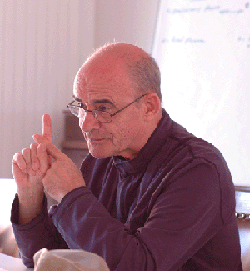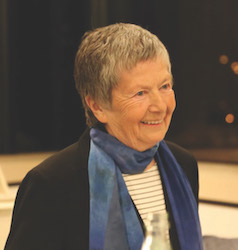
Your complimentary articles
You’ve read one of your four complimentary articles for this month.
You can read four articles free per month. To have complete access to the thousands of philosophy articles on this site, please
News
News: October/November 2021
New translation of all Plato’s dialogues • Heideggerian hacker claims moral stance • Passing of a prominent French thinker — News reports by Anja Steinbauer
New Plato Translation
It took thirteen years, but he has done it: Dr David Horgan of the Trinity Plato Centre in Dublin has given the world a new translation of the complete works of Plato. It is the first time the complete writings of Plato have been translated from ancient Greek into English by one scholar since 1871 when Oxford scholar Benjamin Jowett produced his now standard translation of the same works. Horan’s new translation is freely available online at www.platonicfoundation.org. In an introduction, Horan acknowledges the sponsorship and support he received from others: “Since the entire project has proceeded in a spirit of great generosity, it would, I believe, be inappropriate to introduce any commercial considerations at this stage. It is my firm belief that work that was freely and selflessly supported should be readily accessible to anyone who wishes to make use of that work.” In one respect the project is not quite complete, for Horan says: “Although the translations on this site have, in many cases, already been through a series of edits, this year, 2021, marks the beginning of an extensive two-year revision period after which this work shall, God willing, be published in printed form, perhaps in a single volume, at the lowest possible price to ensure its ready availability to anyone who wishes to access the wisdom of Plato.”
A Philosophical Bank Robber
Here is an unusual use of philosophy that has made headlines. A massive theft of crypto currency recently sent Poly Network’s customers into a short panic. In the largest heist in the history of crypto currencies, the thief got away with 610 million dollars worth of Ether, Tether, Polygon and Binance tokens. However, instead of making off with his loot, the hacker offered to return the money, stating “I have enough money” and then involved Poly Network in a dialogue, which on his side was strongly philosophical in nature. “I have been exploring the meaning of life for a while,” he said, then quoted Heidegger’s thoughts on ‘being unto death’. This notion refers to our consciousness of our time being finite. Heidegger says that only once we fully realise that time is running away from us can we decide how we truly want to live our lives. Though the hacker admitted embarking on his project with selfish motives, he then changed his mind: “I realized being the moral leader would be the coolest hack I could ever achieve!” So he returned the funds.
Prize for Klaus Theweleit
The thinker Klaus Theweleit has just been awarded the 2021 Theodor W. Adorno Prize. Theweleit’s best known book is Male Fantasies (1977), a study of the ‘proto-fascist consciousness’ and the bodily experience of the former soldiers who made up the Freikorps militias of Weimar Germany; men who then helped the rise of the Nazi dictatorship. “By doing this he has provided an analysis of mechanisms of discrimination and male violence which reaches into the present, giving us an exemplar of where dangers to democracy and humanity lurk,” comments the Mayor of Frankfurt, Peter Feldmann. Theweleit develops a theory of ‘fascist male imprinting and socialization’, drawing on empirical studies and theoretical concepts from Wilhelm Reich, Margaret Mahler, Michel Foucault, Melanie Klein, and others. The prize he received is awarded every three years by the City of Frankfurt, with a value of 50,000 euros. Named after the Frankfurt School philosopher Theodor Adorno, it honours, in line with Adorno’s own interests, thinkers who make outstanding contributions to philosophy, music, theatre or film. Former winners include Judith Butler, Georges Didi-Huberman and Margarete von Trotta.
…And An Even Bigger Prize for Peter Singer
Peter Singer is the recipient of the 2021 Berggruen Prize, awarded annually by the Berggruen Institute to a thinker whose ideas have “profoundly shaped human self-understanding and advancement in a rapidly changing world.” Singer is known for many influential and sometimes highly controversial works in applied ethics, including Animal Liberation (1975) which became the founding text of the animal rights movement. Singer has long advocated sharing our wealth with those suffering poverty and disadvantage and is known to give 40 per cent of his own income to charity. “Few academic philosophers have ever had the impact of Peter Singer,” declared Kwame Anthony Appiah, the chair of the prize jury. The father of the ‘effective altruism’ movement, Singer says he’ll donate half of the $1 million award money to The Life You Can Save. This is an organization he founded in 2009 to promote the idea that philanthropy should be guided by rationally assessing how the money you donate can save or improve the lives of the greatest number of people.
Jean-Luc Nancy Has Died

Jean-Luc Nancy lecturing in 2006
French philosopher Jean-Luc Nancy has died at the age of 81. Though not as internationally famous as his colleagues Michel Foucault and Jacques Derrida, within France Nancy is considered one of the most influential contemporary thinkers. His focus was on combining philosophy, political theory and current affairs, wanting to explore “what this life is that we’re experiencing.” To do this, Nancy adopted Derrida’s method of deconstruction and applied it to political contexts. Rethinking deconstructionism meant, to him, rethinking entrenched oppositions such as religion and atheism or mind and body. By thinking these pairs of oppositions together, the opposites often got resolved, yielding interesting new perspectives. One of Nancy’s last books used this method to explore the social meaning of the COVID crisis. It is titled Un trop humain virus – ‘an all-too-human virus’.
Photo Credit: Irigaray by Babich

Luce Irigaray, photo by Babette Babich
Back in Issue 128 we printed a photo of Luce Irigaray to illustrate a review of her 2017 book To Be Born: Genesis of a New Human Being, which our reviewer called “a dense but readable defence of individuality amidst a culture that fosters conformity.” We’ve just learned that the photo was taken by Professor Babette Babich, of Fordham University, herself a well-known philosopher on a wide range of topics including Heidegger and the philosophy of science and technology. We’d therefore like to make this very belated photo-credit.









